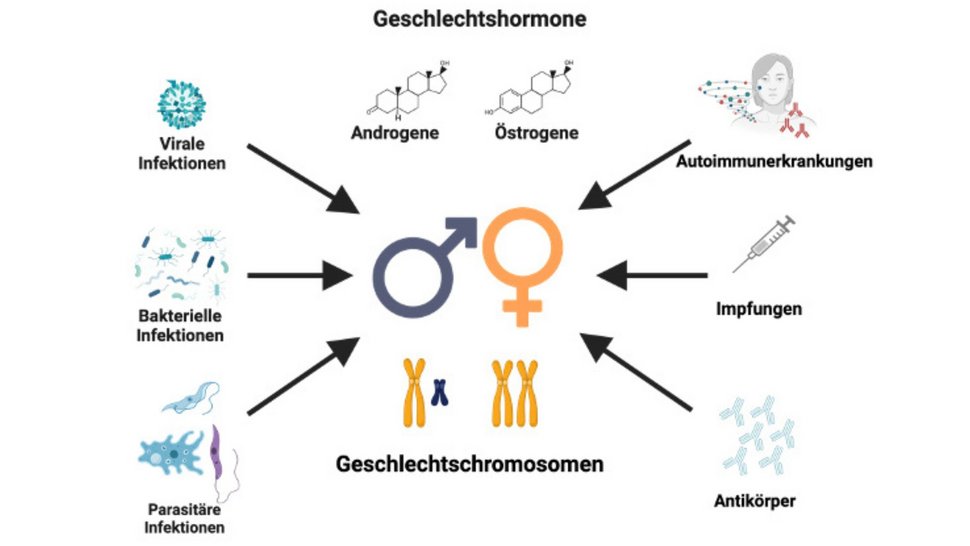Five million euros for research unit 'Sex-specific differences in the immune response‘
DFG extends funding for BNITM and partner institutions
The German Research Foundation (DFG) is funding the Research Unit 'Sex-specific Differences in the Immune Response' for another four years with five million euros. Scientists in the research unit will work together to identify the causes and mechanisms behind the different responses of the immune system in women and men. In the long term, the findings will help advance personalised medicine.

The Bernhard Nocht Institute for Tropical Medicine (BNITM), the Departments of Immunology, Autoimmune Diseases, Paediatrics, Infectiology and Tumour Research at the University Medical Center Eppendorf (UKE), the University Medical Center Mannheim and now the Research Center Borstel, Leibniz Lung Center (FZB) are involved in the project with a total of nine project groups. The project has been funded by the DFG since 2021. The spokespersons of the research unit are Prof. Dr Hanna Lotter from the BNITM and Prof. Dr Marcus Altfeld, Director of the Institute of Immunology at the UKE and the Leibniz Institute of Virology (LIV).

'Sex-specific research is essential in order to better understand the different biological and hormonal influences on diseases. This is the only way we can develop personalised therapies that meet the individual needs of men and women,’ explains Hanna Lotter, head of the Molecular Infection Immunology research group at the BNITM.
In particular, the researchers are investigating how sex hormones influence the function of immune cells. The better we understand how biological gender-specific differences affect the symptoms and progression of diseases, the better we can take this into account in treatment.
In close collaboration with Dr Bianca Schneider, head of the research group Host Determinants in Pulmonary Infections at the FZB, Hanna Lotter's team will investigate the role of immune metabolism in the sex difference in the infectious diseases tuberculosis (caused by the pathogen Mycobacterium tuberculosis) and amoebiasis of the liver (caused by the parasite Entamoeba hystolytica). Their main focus will be to investigate the effects of hormone treatment with testosterone or estradiol on monocytes - a type of immune cell - in trans men and trans women.
Background information on sex differences in the immune response to parasitic diseases
In a review article article (Sellau J. et al. “Immunological clues to sex differences in parasitic diseases” Trends Parasitol. 2024), Hanna Lotter's team summarised the known sex-specific differences in the immune response to parasitic diseases such as Chagas disease, malaria, leishmaniasis, amoebiasis and worm infections. Biological differences such as hormones, particularly testosterone, play a significant role in immune response and disease severity. Men often have a more severe course of the disease, which is linked to higher testosterone levels. Women tend to have a stronger immune response, which is boosted by oestrogen. In some cases, women clear asymptomatic infections more quickly and develop more specific antibody responses. Understanding these differences could help to develop personalised treatment strategies for parasitic diseases. The authors emphasise that more research is needed to better understand the underlying mechanisms.
Link to the research unit 'Sex-specific differences in the immune response‘
www.uke.de/kliniken-institute/institute/immunologie/research-unit-5068/index.html
Related article
www.bnitm.de/dfg-foerderung-fuer-sex-differences
Contact person
Prof. Dr Hanna Lotter
Research Group Leader
Phone : +49 40 285380-475
Email : lotter@bnitm.de
Dr Anna Hein
Public Relations
Phone : +49 40 285380-269
Email : presse@bnitm.de
Julia Rauner
Public Relations
Phone : +49 40 285380-264
Email : presse@bnitm.de






